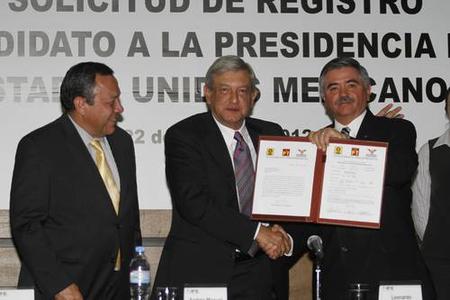Six years after being denied Mexico’s presidency in a disputed vote count, the presidential candidate of Mexico’s “lefts,” Andrés Manuel López Obrador (AMLO), says he is a “man without resentments.” Well, maybe, but when he formally registered his candidacy last week before the Federal Electoral Institute (IFE), the non-partisan authority that organizes and oversees the country’s federal elections, he told the group that he still holds it responsible for his 2006 defeat. “As electoral authorities you have a great responsibility,” he told the vote-counting civil servants who processed his registration. “I hope you are equal to the task; that what happened in 2006 does not repeat itself; that you do not once again step on the rights of the citizens; that you respect the will of the people.”
A few days later, he told the Spanish newspaper El País that Felipe Calderón, Mexico’s current president to whom IFE granted the presidency in 2006, “was not only corrupt but also dishonest,” and that dishonesty was a worse trait than corruption because it meant not only keeping the money but never suffering any consequences for it. He also told the Spanish paper that he harbored no resentments. “I extend my open hand to all. I am not a man of resentments. I forgive everyone, and I forgive [Calderón] in particular. I don’t want vengeance; I want justice, and the country demands reconciliation under new rules.” He added that if he were elected president this year, he would not conduct an investigation into the results of the 2006 election. “There is already a historical judgment,” he said, “which is more important.”
His forgiveness even seems to extend to former president Vicente Fox, who led a particularly nasty campaign against him in 2006. When the former president offered his hand to AMLO at the papal mass celebrated last weekend in Guanajuato, the leftist candidate shook it. “I couldn’t just leave his hand stretched out to me,” he later told the press.
AMLO, of course, has every right to be resentful—useless as that sentiment may be. Despite the scant hard evidence that Felipe Calderón’s conservative National Action Party (PAN) committed significant election-day fraud six years ago, the closeness of the vote and the nastiness of the PAN’s campaign supported the demand of the left-of-center Party of the Democratic Revolution (PRD) that the presidential vote be subjected to a total recount—a recount the IFE never ordered. A credible, transparent recount, regardless of the outcome, might have made Mexico a bit more governable over the past six years.
The PAN campaign of 2006 was vicious, negative, divisive and for the most part dishonest—and disingenuously supported by a powerful state apparatus. While the evidence of out-and-out election-day fraud was weak and subject to multiple interpretations, there was clearly a great deal of disingenuous irregularity in the PAN’s presidential campaign, an irregularity born of the political advantage made full use of by the governing party: President Fox’s illegal (by Mexican law) active campaigning for Calderón, the creation of a climate of fear to promote the vote against AMLO, illegal campaign overspending by the PAN (not sanctioned by the IFE), and employer pro-PAN coercion of the votes of their employees.
Irregularities and disingenuous practices, however, do not constitute fraud, and to confuse the two is to confuse the genuine case against the transformation of modern-day political democracy into a series of marketing campaigns of the kind perfected by U.S. political advisors.
Just enough Mexican voters were convinced by the PAN’s marketing campaign that AMLO was a danger to the Republic, a threat to Christianity, a threat to their homes and property, a fanatic who would invite a U.S. invasion. That’s what made the vote (fraud or not) so close. That’s why many Mexicans believed the PAN would stop at nothing to win. That’s why they believed “there must have been” fraud. That’s why there should have been a transparent recount. That’s why the election of 2006 is haunting the election of 2012. The past, as William Faulkner once remarked, is not dead. It isn’t even past. López Obrador has chosen—at least tactically—to forgive, but not to forget.
For more from Fred Rosen's blog, "Mexico, Bewildered and Contested," visit nacla.org/blog/mexico-bewildered-contested.

